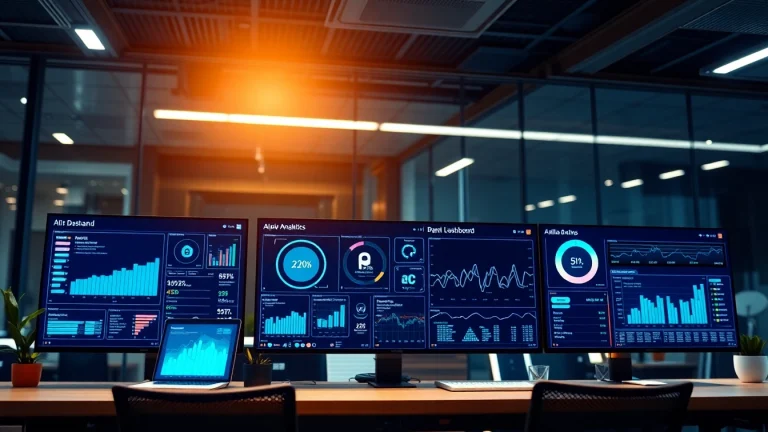
Harnessing AI Marketing Agents for Efficient Campaign Automation and Insights
Understanding AI Marketing Agents
Definition and Functionality
AI marketing agents are sophisticated software tools designed to automate various marketing tasks utilizing artificial intelligence technology. They can perform functions such as customer segmentation, personalized content delivery, campaign optimization, and data analytics. These agents operate with a level of autonomy, fulfilling specific roles while still requiring human oversight to ensure alignment with broader marketing strategies and goals. In essence, they serve as an extension of marketing teams, enabling organizations to enhance their marketing effectiveness while optimizing resources.
How They Differ from Traditional Marketing
Traditional marketing methods often rely on manual processes, with marketers conducting repetitive tasks such as data entry, analysis, and segmentation. AI marketing agents, on the other hand, leverage machine learning algorithms and large datasets to automate these processes, enabling faster decision-making and implementation. For instance, while a traditional marketer may spend hours analyzing customer data to understand buying patterns, an AI marketing agent can do this in seconds, delivering insights that facilitate immediate action. This shift not only improves efficiency but also allows for greater adaptability in responding to market changes and consumer behaviors.
The Role of Human Oversight
Despite their automation capabilities, AI marketing agents are not a replacement for human marketers. The human touch remains crucial in interpreting complex insights generated by these agents and ensuring that marketing messages align with brand values and customer expectations. Oversight is particularly important when it comes to ethical considerations surrounding data privacy and the creation of content that resonates emotionally with audiences. Human marketers are responsible for establishing the strategic vision and checking that AI-generated outputs conform to regulatory standards and marketing ethics.
Key Benefits of Using AI Marketing Agents
Enhanced Efficiency in Campaign Management
Implementing AI marketing agents leads to a substantial increase in efficiency during campaign management. These agents can automate routine tasks such as sending emails, social media posting, and performance reporting, freeing up valuable time for marketers to focus on strategy and creative development. According to research, organizations utilizing AI for marketing tasks experience a significant reduction in time spent on tactical execution, allowing teams to shift their focus towards more innovative projects.
Personalization and Customer Engagement
Personalization has become a cornerstone of effective marketing strategies, and AI marketing agents excel in this area. By analyzing vast amounts of customer data, these agents can create highly tailored marketing messages and recommendations that align with individual preferences and behaviors. For example, an AI agent can determine which products a customer is most likely to buy based on previous interactions and automatically generate personalized email campaigns. This approach enhances customer engagement, leading to higher conversion rates and increased loyalty.
Data Analysis and Insights Generation
Data is one of the most valuable assets in marketing today, and AI marketing agents are adept at turning raw data into actionable insights. They can analyze customer interactions across multiple channels, identify trends, and predict future behaviors. This level of analysis is not feasible with traditional methods due to the sheer volume of data involved. By generating insights, AI agents enable marketers to make data-driven decisions that optimize campaigns and improve overall marketing performance.
Top AI Marketing Agents in 2025
Overview of Leading Tools and Platforms
The landscape of AI marketing agents is rapidly evolving, with numerous tools emerging to meet the varying needs of marketers. Some of the leading platforms include:
- HubSpot: Offers a comprehensive suite of marketing tools enhanced with AI capabilities, focusing on inbound marketing automation.
- Marketo: Provides advanced marketing automation features that utilize AI for lead scoring and campaign optimization.
- Salesforce Marketing Cloud: Leverages AI to drive personalized customer experiences and optimize marketing efforts across channels.
- Mailchimp: Utilizes AI to help marketers send targeted emails at optimal times, improving open rates and engagement.
- Relevance AI: Specializes in machine learning-based analysis for better audience targeting and engagement.
Comparative Analysis of Features
When comparing AI marketing agents, several features stand out as essential for effectiveness:
- Automation Capabilities: The ability to automate numerous marketing tasks, from email sending to social media posts.
- Data Integration: Seamless integration with various data sources to pool insights from CRM, social media, and other platforms.
- Analytical Tools: Advanced analytics that offer in-depth reporting, trend analysis, and forecasting capabilities.
- User Experience: Intuitive interfaces that allow marketers to navigate easily and effectively use the platforms.
User Testimonials and Case Studies
Real-world success stories demonstrate the effectiveness of AI marketing agents. For instance, a case study of a leading e-commerce retailer revealed that implementing an AI marketing agent increased their conversion rates by 30% within three months. Users frequently cite enhanced targeting capabilities and improved ROI as key advantages of adopting these technologies. Additionally, testimonials highlight immediate impacts on efficiency, with one marketing manager noting a 50% reduction in time spent on routine tasks.
Implementing AI Marketing Agents in Your Strategy
Steps to Integrate with Existing Tools
To successfully implement AI marketing agents, businesses should follow these crucial steps:
- Assess Current Tools: Evaluate existing marketing tools and identify areas where AI can fill gaps or enhance capabilities.
- Select the Right AI Agent: Based on specific needs (automation, personalization, analytics), choose an AI agent that aligns with business objectives.
- Train Your Team: Provide training to team members to ensure effective use of new tools and maximize potential benefits.
- Monitor and Adjust: Continuously monitor performance metrics and be willing to adjust strategies as needed based on data-driven insights.
Best Practices for Maximizing ROI
Maximizing return on investment (ROI) from AI marketing agents requires strategic planning and execution. Best practices include:
- Define Clear Goals: Establish what you aim to achieve with the AI marketing agent, whether it is higher engagement, improved lead generation, or increased sales.
- Utilize A/B Testing: Regularly conduct A/B tests to determine which approaches resonate best with your audience and refine your tactics iteratively.
- Leverage Data Insights: Use the insights generated by AI to inform content creation, tailored campaigns, and targeting strategies.
- Gather Feedback: Solicit feedback from both your marketing team and customers to understand how the AI agent’s outputs are received and perceived.
Common Challenges and Solutions
While integrating AI marketing agents offers numerous benefits, challenges can arise. Common hurdles include:
- Data Quality: Insufficient data quality can lead to poor performance. To address this, ensure data cleansing and validation processes are in place.
- Resistance to Change: Team members may resist new technologies. Encourage buy-in by showcasing successful case studies and providing comprehensive training.
- Integration Difficulties: Complexities in integrating with existing systems can occur. Consider enlisting technical support from both the AI vendor and internal IT teams during implementation.
The Future of AI Marketing Agents
Trends to Watch in the Coming Years
The AI marketing landscape is rapidly evolving, with notable trends expected to shape the future. Some key trends to observe include:
- Increased Personalization: As AI technology advances, marketers will be able to deliver even more personalized experiences by predicting user behavior more accurately.
- AI-Powered Insights: Expect advancements in AI’s ability to analyze data, offering deeper insights that can redefine marketing strategies.
- AI Ethics and Regulations: As AI’s influence grows, so will scrutiny regarding data privacy and ethical use, prompting organizations to develop guidelines for responsible AI implementation.
Potential Impact on the Marketing Industry
The rise of AI marketing agents is poised to profoundly impact the marketing industry. With automation handling routine tasks, marketers can shift focus to strategic planning and creative innovation. Furthermore, increased efficiency may allow smaller companies to compete with larger organizations by leveling the playing field in access to sophisticated marketing tools.
Preparing for Changes in Consumer Behavior
As the market evolves, consumer behavior will also shift. AI marketing agents will play a critical role in interpreting these changes, helping businesses remain agile and responsive. The key will be developing a proactive approach—staying ahead of transition trends and adjusting marketing strategies accordingly. Continuous learning and adaptation will be necessary to meet the demands of increasingly discerning consumers who expect tailored, instantaneous, and relevant interactions with brands.


